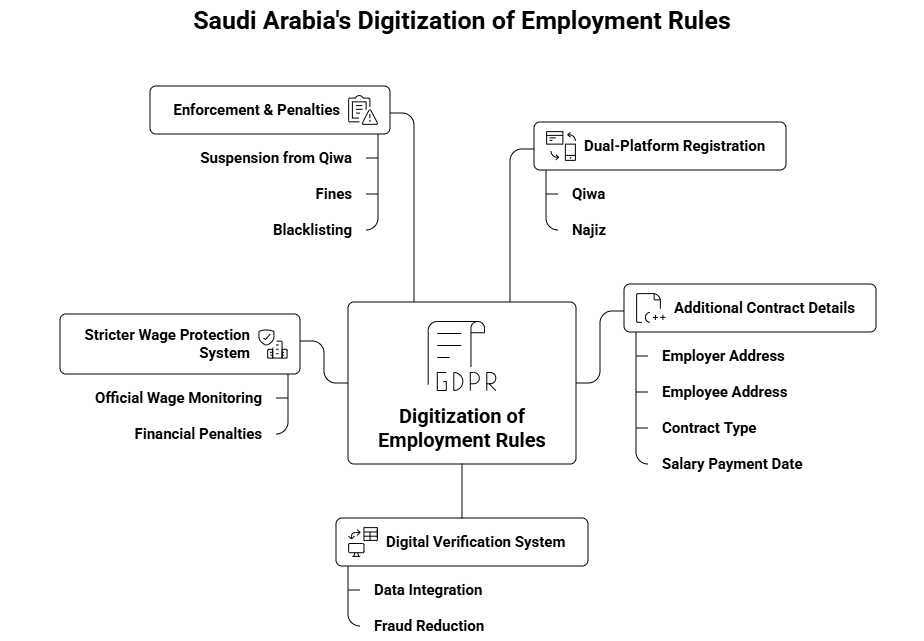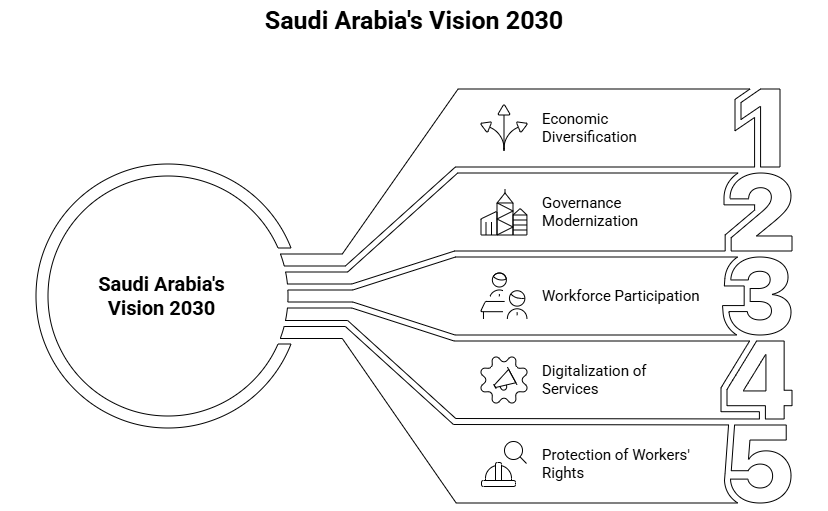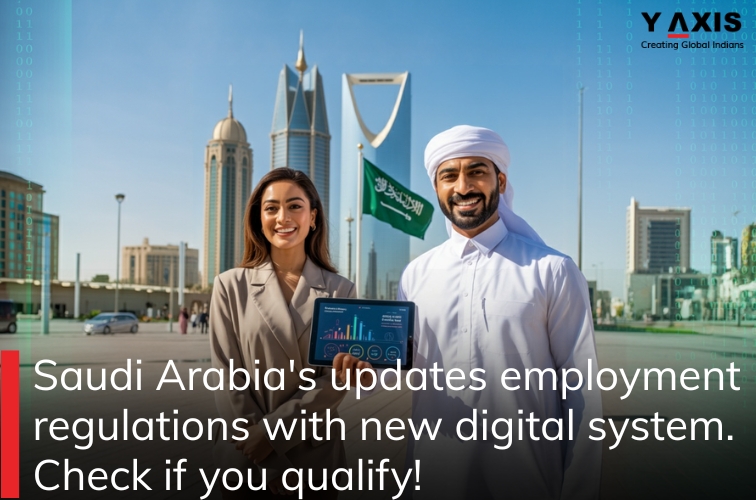Posted on October 31 2025
Saudi Arabia's updates employment regulations with new digital system. Check if you qualify!
By , Editor
Updated November 15 2025
Highlights: Saudi Arabia Tightens Job Contract Rules to Boost Worker Protection
Saudi Arabia has introduced new labor contract regulations under Vision 2030 to enhance transparency and protect private-sector employees.
- All employment contracts must now be registered on both Qiwa and Najiz government platforms.
- Employers must include verified national addresses, contract type, and exact salary payment dates in every agreement.
- The Wage Protection System (WPS) has been strengthened to ensure timely salary payments and reduce disputes.
- Companies failing to comply face strict penalties, including fines, blacklisting, and suspension from official systems.
*Want to work in Saudi Arabia? Sign up with Y-Axis to guide you with the process.
Saudi Arabia Digitizes Employment Rules to Protect Workers and Promote Transparency
Saudi Arabia’s latest move to digitize and tighten employment contract rules marks a major step under its Vision 2030 reforms — aimed at improving transparency, ensuring accountability, and protecting worker rights in the private sector.
The Ministry of Human Resources and Social Development (MHRSD) announced that all employment contracts will now be digitally linked with official government databases for enhanced legal verification. Previously, employers only had to register contracts through the Qiwa platform. With the new rules, contracts must also be verified through the Najiz system managed by the Ministry of Justice, making them legally enforceable and tamper-proof.

The MHRSD outlined key updates that employers must adhere to:
- Dual-platform registration:
Every employment contract must now be uploaded to Qiwa and authenticated through Najiz, ensuring both HR and legal validation.
- Additional contract details:
Employers must provide precise information such as:
- Employer and employee’s registered national addresses
- Type of contract (fixed-term or non-fixed-term)
- Exact salary payment date
- Digital verification system:
This integration allows the government to cross-check data in real-time, reducing the chances of contract fraud or tampering.
- Stricter Wage Protection System (WPS):
Salaries must be transferred through the official wage monitoring system. Delays or discrepancies could trigger financial penalties or suspension of services for employers.
- Enforcement & penalties:
Companies that fail to comply with the new rules risk suspension from the Qiwa system, fines, or blacklisting from hiring new employees.
Also, read…
Saudi Arabia’s Green Card to attract skilled professionals. Are you eligible?
How the New Labor Rules Benefit Indian Workers in Saudi Arabia
For Indian professionals already working or planning to work in Saudi Arabia, the new labor contract verification system promises greater transparency, fairness, and job security. These reforms are designed to protect employees’ rights while ensuring that employers maintain accountability in their hiring and wage practices.
Here’s how Indian workers stand to benefit from the new system:
- Legal clarity: All employment contracts are now digitally verified and legally recognized, offering stronger protection against unfair dismissals or unauthorized contract changes.
- Timely salary payments: The enhanced Wage Protection System (WPS) ensures that salaries are disbursed on schedule, significantly improving worker welfare.
- Reduced risk of fraud: Employees can now verify the authenticity of their contracts online, preventing fake job offers and unregistered employment.
- Simplified documentation: The integration of the Qiwa and Najiz platforms allows workers to easily access, download, and manage verified copies of their employment contracts.
- Better working conditions: These Vision 2030 reforms aim to improve the overall quality of life for the Kingdom’s 10 million+ expatriate workers, many of whom come from India.
Also, read…
Saudi Arabia to launch a pension and savings programme for foreign workers
Saudi Arabia’s Vision 2030 and the Future of Work
The Vision 2030 initiative aims to diversify Saudi Arabia’s economy, modernize governance, and enhance transparency across sectors.
In the labor market, the focus is on:
- Increasing workforce participation among Saudis and expatriates.
- Digitizing government services for faster verification and record-keeping.
- Protecting foreign workers’ rights and ensuring fair treatment.

According to the Saudi government, the introduction of dual registration and real-time monitoring will reduce labor disputes and improve employer accountability, setting a new benchmark for fair employment practices in the Gulf region.
*Are you looking for step-by-step assistance with overseas immigration? Contact Y-Axis, the world’s No. 1 overseas immigration consultancy!
For recent immigration updates, check out Y-Axis News Page!
FAQs
What new employment contract rules has Saudi Arabia implemented?
Saudi Arabia has introduced stricter employment contract rules through a new digital verification system aimed at increasing transparency and compliance in the labor market. The new system ensures that all employment contracts for expatriate and local workers are verified electronically through the Ministry of Human Resources and Social Development (MHRSD). This move strengthens oversight, prevents contract tampering, and aligns with the Kingdom’s ongoing labor reforms under Vision 2030 to enhance workforce governance and protect worker rights.
What is the purpose of the new digital verification system for employment contracts in Saudi Arabia?
The digital verification system aims to ensure authenticity and fairness in employment contracts across all sectors in Saudi Arabia. It allows both employers and employees to verify contracts electronically, minimizing disputes over contract terms and employment conditions. By digitizing the process, the system enhances accountability, prevents alterations after signing, and ensures that contract details match what was approved by authorities. This initiative supports a transparent labor environment and boosts the confidence of foreign workers in Saudi Arabia’s employment system.
When will the new employment contract verification system come into effect in Saudi Arabia?
The implementation of Saudi Arabia’s new employment contract verification system begins in late 2025, following pilot phases introduced by the MHRSD. The rollout aims to make digital verification mandatory for all private sector companies within a specified transition period. Employers are required to upload and confirm contracts through the official platform, ensuring data accuracy before approval. This phased approach gives companies time to adapt to the digital process while ensuring compliance with the new labor framework set by Saudi authorities.
Who is responsible for implementing the digital verification system for employment contracts in Saudi Arabia?
The Ministry of Human Resources and Social Development (MHRSD) is the key authority implementing the digital verification system for employment contracts in Saudi Arabia. The Ministry oversees the integration of the system with employer databases and the Qiwa platform to ensure seamless processing and validation. By enforcing these new rules, MHRSD seeks to promote fairness in employment relationships, safeguard worker rights, and enhance employer accountability. The system also aligns with Saudi Arabia’s broader goal of digitizing public services and improving labor governance efficiency.
How will the digital verification system affect foreign workers in Saudi Arabia?
The new digital system will significantly benefit foreign workers in Saudi Arabia by ensuring their contracts are legally verified and protected against unauthorized changes. It allows expatriate employees to review and confirm their contract details directly through an online portal before starting work. This prevents discrepancies between job offers and actual employment terms, a common concern among migrant workers. The reform enhances job security, promotes fair employment practices, and supports Saudi Arabia’s goal of creating a more transparent and worker-friendly labor market.
What changes will employers in Saudi Arabia need to make under the new contract rules?
Employers in Saudi Arabia will now be required to submit employment contracts through the MHRSD’s digital platform for electronic verification. They must ensure that all contract terms, including wages, job titles, and working conditions, match the approved employment offers. Failure to comply with the verification process could result in penalties or delays in processing work permits. The new system encourages employers to maintain accurate records, reduce administrative errors, and uphold fair employment standards, aligning with the Kingdom’s digital transformation and regulatory reforms.
How does the new system ensure transparency and prevent contract manipulation?
The new verification system ensures transparency by digitally recording and validating every employment contract through official government channels. Once verified, the contract cannot be altered without mutual consent and approval by the Ministry. This prevents manipulation or fraudulent modifications that previously disadvantaged workers. Both employers and employees can access the verified version online, ensuring mutual understanding and legal protection. The system’s transparency also strengthens Saudi Arabia’s reputation for fair labor practices, especially for its large expatriate workforce.
Will the new digital verification system apply to all private sector employees in Saudi Arabia?
Yes, the digital verification system will apply to all private sector employees in Saudi Arabia, including both Saudi nationals and expatriates. All employers must register and verify employment contracts electronically through the MHRSD’s digital platform. The rule covers new hires as well as renewals of existing contracts. This uniform approach ensures that all workers, regardless of nationality or occupation, enjoy the same level of transparency and protection. The system will gradually extend to all industries as part of Saudi Arabia’s labor digitalization initiative.
What benefits will the new system offer to both employers and employees?
The new digital system benefits both employers and employees by simplifying procedures, reducing disputes, and improving compliance. Employers gain a centralized and secure way to manage workforce contracts, while employees benefit from transparent and verifiable employment terms. The system helps prevent exploitation, builds trust in employment relationships, and supports efficient documentation management. By automating verification, the process also saves time, enhances record accuracy, and aligns with Saudi Arabia’s broader efforts to modernize its labor market infrastructure.
How does the new employment contract system align with Saudi Arabia’s Vision 2030 labor reforms?
Saudi Arabia’s new employment contract verification system is part of its Vision 2030 labor reform strategy aimed at modernizing the Kingdom’s job market. It supports goals such as enhancing transparency, protecting worker rights, and improving the business environment for both local and international employers. By integrating digital tools into employment procedures, Saudi Arabia aims to attract skilled foreign talent and reduce administrative inefficiencies. The reform complements other initiatives under Vision 2030 that promote workforce competitiveness and economic diversification.
Tags:
Saudi Arabia's new employment regulations
Migrate to Saudi Arabia
Work in Saudi Arabia
Saudi Arabia work permit
work abroad
work overseas
overseas immigration news
UAE immigration news
UAE news
digital verification system
Saudi Arabia employment
Share
Options for you by Y-Axis
Get it on your mobile
Get News alerts
Contact Y-Axis

